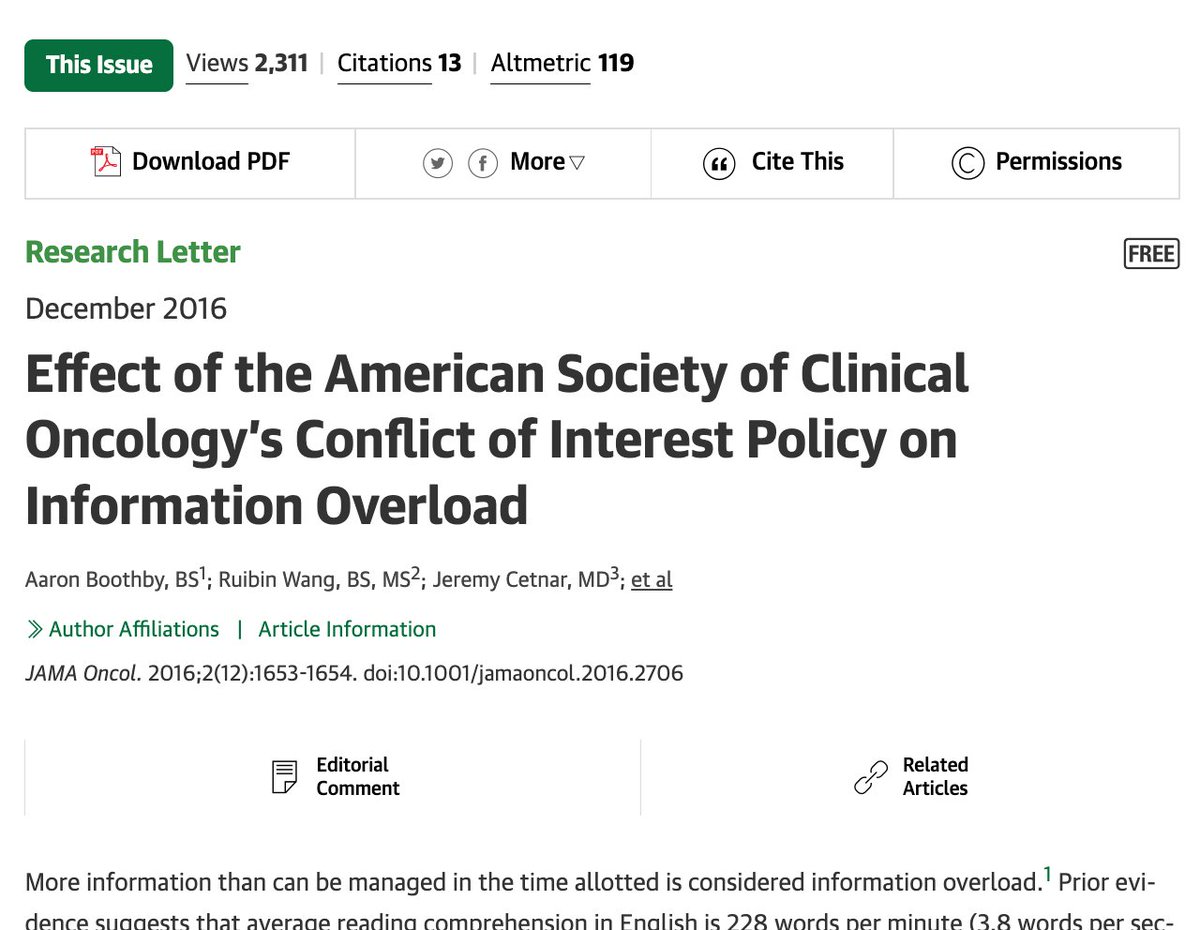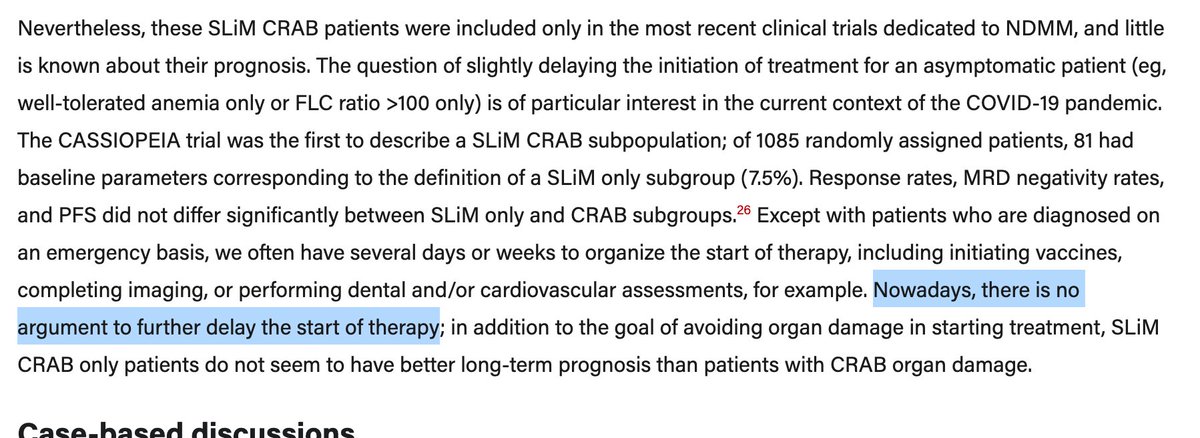
As you read the #ASCO22 abstracts, here are some tips I offer to separate true & useful from all the rest
PS: The Amgen ad on the banner of the abstract page is emblematic of what you have to contend with
🧵
PS: The Amgen ad on the banner of the abstract page is emblematic of what you have to contend with
🧵

I. Let me start with observational/ uncontrolled studies. These can be useful to describe prognosis, identify risk factors, track time trends, establish activity, etc. but there are many caveats
1. An abstract shows survival improves by decade in a cancer - author claims it is due to better drugs
Possibly yes, but also possible the definition of the cancer is different (AHEM myeloma), we look for it more often, our CT/PET scan is more sensitive (stage migration), etc.
Possibly yes, but also possible the definition of the cancer is different (AHEM myeloma), we look for it more often, our CT/PET scan is more sensitive (stage migration), etc.
The last point is under-appreciated. If you find someone who has a large colon mass and a tiny liver or lung met, that person might not have had the tiny met discovered in '99 (stage III) but in '22 they do & are stage IV
This shift will improve 5 year survival in BOTH groups!
This shift will improve 5 year survival in BOTH groups!
It is called the Will Rogers phenomenon. (look up joke about Okies moving to Cali)
If you unpack these things, the truth is more complex, as we find with CRC. It is not all "better drugs"
jamanetwork.com/journals/jamao…
If you unpack these things, the truth is more complex, as we find with CRC. It is not all "better drugs"
jamanetwork.com/journals/jamao…
2. Observational study shows which cancer patients do worse when they have COVID19:
Let me guess?
Being older, on more medications, with more rapidly progressive cancer (aka being sicker/ more vulnerable)
Ask yourself if you are learning anything that isn't blatantly obvious
Let me guess?
Being older, on more medications, with more rapidly progressive cancer (aka being sicker/ more vulnerable)
Ask yourself if you are learning anything that isn't blatantly obvious
Next, think about the Table 2 fallacy
Most people doing this work are totally vulnerable to this b/c they are amateurs
Most people doing this work are totally vulnerable to this b/c they are amateurs
https://twitter.com/MaartenvSmeden/status/1302156908191772672?s=20&t=4i7hviB5Fh43-BoTCLDA-w
3. New cancer drug does great in uncontrolled study
BRAVO!
Of course, consider that authors cherry picked their patients for the phase 1/2 trial!
Only the healthiest/ pan sensitive/ indolent tumor biology are included
It is not all comers!
BRAVO!
Of course, consider that authors cherry picked their patients for the phase 1/2 trial!
Only the healthiest/ pan sensitive/ indolent tumor biology are included
It is not all comers!
3. An uncontrolled trial can establish that there is some response rate, which is a measure of drug ACTIVITY
But it cannot tell you EFFICACY--- that people live longer or better than alternatives
But it cannot tell you EFFICACY--- that people live longer or better than alternatives
4. Drug has lousy single agent activity, but might be useful in combination....
Shut up! No it won't be.
These drugs do awful in drug development. The denominator is millions, the numerator is a dozen+, the ones that succeed are mediocre |1.4 mo os
drive.google.com/file/d/1yxamqR…
Shut up! No it won't be.
These drugs do awful in drug development. The denominator is millions, the numerator is a dozen+, the ones that succeed are mediocre |1.4 mo os
drive.google.com/file/d/1yxamqR…
5. Among people who respond to a drug, survival is better than those who do not respond!
Also among those who have EFS events vs those who don't
Get out of here! This is an elementary error.
Also among those who have EFS events vs those who don't
Get out of here! This is an elementary error.
https://twitter.com/VPrasadMDMPH/status/1530355385143480321?s=20&t=4i7hviB5Fh43-BoTCLDA-w
Analyzing outcomes by response is a flawed way to infer efficacy-- this has been known since 1983!
Stop it already!
(almost as old as me)
pubmed.ncbi.nlm.nih.gov/6668489/
Stop it already!
(almost as old as me)
pubmed.ncbi.nlm.nih.gov/6668489/
6. We compared CAR-T patients to the database of....
GTFO
Comparing the ultra select patients in CAR-T trials to all comers.. pointless exercise
Let me guess? the paper is written by pharma?
GTFO
Comparing the ultra select patients in CAR-T trials to all comers.. pointless exercise
Let me guess? the paper is written by pharma?
7. Cost effectiveness analysis sponsored by pharma shows it is cost effective
Or CEA written by first and last author with conflicts & all middle authors work for consulting firm..
I am sure the first author did so much work
This is all bad
jamanetwork.com/journals/jaman…
Or CEA written by first and last author with conflicts & all middle authors work for consulting firm..
I am sure the first author did so much work
This is all bad
jamanetwork.com/journals/jaman…
II Lets turn to randomized trials
Just because it is randomized don't make it good!
Just because it is randomized don't make it good!
1. Is the control arm what you would do otherwise?
17% of FDA registration studies use a control arm known to be inferior to best care
"A trial can only change your practice if the control arm is your practice!"
-vp
drive.google.com/file/d/1jNN1sW…
17% of FDA registration studies use a control arm known to be inferior to best care
"A trial can only change your practice if the control arm is your practice!"
-vp
drive.google.com/file/d/1jNN1sW…
2. Did they improve PFS or did they actually improve OS?
PFS is a poor predictor of OS across most tumor types...
Even DFS has a lousy correlation, and for the class of drugs presented probably no correlation at all!
jamanetwork.com/journals/jamai…
PFS is a poor predictor of OS across most tumor types...
Even DFS has a lousy correlation, and for the class of drugs presented probably no correlation at all!
jamanetwork.com/journals/jamai…
3. IF they improved HR quality of life, did they measure it properly?
I doubt it!
jamanetwork.com/journals/jaman…
I doubt it!
jamanetwork.com/journals/jaman…
4. If you are testing a drug that has never established efficacy (sip T or vandetanib) you DON'T WANT crossover
IF you are trying to move a drug upfront, including to adjuvant you absolutely DO WANT IT
Read this to understand Xover
drive.google.com/file/d/1DQg0ny…
IF you are trying to move a drug upfront, including to adjuvant you absolutely DO WANT IT
Read this to understand Xover
drive.google.com/file/d/1DQg0ny…
5. If the control was investigator choice was it a restricted choice?
or a free, unfettered choice?
This matters
or a free, unfettered choice?
This matters
https://twitter.com/Timothee_MD/status/1484567919057010690
6. Was post-protocol therapy up to the standard of your practice?
This will result in a similar bias as crossover. Bad post protocol care means downstream endpoints (PFS2/ OS) do not apply to your practice
More to come on this topic...
jamanetwork.com/journals/jaman…
This will result in a similar bias as crossover. Bad post protocol care means downstream endpoints (PFS2/ OS) do not apply to your practice
More to come on this topic...
jamanetwork.com/journals/jaman…
7. Was drug dosing fair?
This is a technical point, best explained in our 2014 JCO paper
drive.google.com/file/d/1n4RDxM…
This is a technical point, best explained in our 2014 JCO paper
drive.google.com/file/d/1n4RDxM…

8. If it was a non-inferiority study, is the margin so big you could park a school bus in it?
Was the choice of non-inferiority justified in the first place?
The new drug has to be cheaper, more convenient or less toxic to even run such a trial.
drive.google.com/file/d/1dT3UFx…
Was the choice of non-inferiority justified in the first place?
The new drug has to be cheaper, more convenient or less toxic to even run such a trial.
drive.google.com/file/d/1dT3UFx…

III Stylistic things
Here are a few style things to look for
1. So many authors who didn't do anything
Don't meet authorship criteria
Enrolling pts doesn't make an author see ICMJE rules
Here are a few style things to look for
1. So many authors who didn't do anything
Don't meet authorship criteria
Enrolling pts doesn't make an author see ICMJE rules

3. Its a "virtuous topic"
Good people agree on the right answer
Good people agree on the right answer
https://twitter.com/VPrasadMDMPH/status/1529939744917860352?s=20&t=4i7hviB5Fh43-BoTCLDA-w
4. Speaker flashes the COI slide so fast, no human can read it
Happens 1/3 times as documented by @AaronBoothby2
jamanetwork.com/journals/jamao…
Happens 1/3 times as documented by @AaronBoothby2
jamanetwork.com/journals/jamao…

I left out my favorite one for RCTs
8. Lots of people dropping out is grounds for suspicion
See Vision trial where I explain this bias
Censorship games
8. Lots of people dropping out is grounds for suspicion
See Vision trial where I explain this bias
Censorship games

Ok, you liked this thread and want to learn more. Here is what you can do
1. Check out Malignant, now with 100+ reviews
amazon.com/Malignant-Poli…
1. Check out Malignant, now with 100+ reviews
amazon.com/Malignant-Poli…

2. Watch the 3 (someday 10) part lecture series on cancer clinical trials on Youtube
4. Follow @vkprasadlab for updates on papers that probe these biases
https://twitter.com/vkprasadlab/status/1483469691918053378?s=20&t=4i7hviB5Fh43-BoTCLDA-w
• • •
Missing some Tweet in this thread? You can try to
force a refresh












